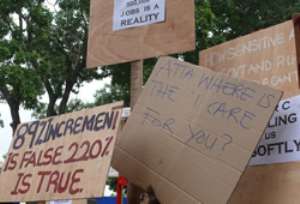
Following the inter political parties consultation with the Public Utilities Regulatory Commission (PURC) last Monday, the Convention People’s Party (CPP) reaffirms that the proposed tariff increases are draconian, unprecedented and highly insensitive to the plight of Ghanaians.
The State of Our Utility Companies
The Volta River Authority (VRA), the main power producer in Ghana, currently operates a total installed electricity generation capacity of 1972 MW. The major power producer after the 2013 major tariff reviews had embarked on some capital projects to increase their generation capacity. This is commended by the CPP, however, the company is in huge financial distress due to government’s failure to pay debts owed VRA. The company itself owes financial institutions over $1,311.43 million due to the inability of ECG and some bulk power purchasing firms to honour their debt obligations. These factors have affected the smooth operations of the company as management continues to fail to retrieve monies owed them.
The Electricity Company of Ghana (ECG), which has been offered for sale by the Government, is facing shortfalls in both power sales and revenue collection. The company has not been able to recover debts owed by government agencies and departments. These inefficiencies are heightened by the increase in system losses of 24.93%, from 23.37% in 2013. The CPP is of the view that management is under pressure from Government to push for tariff increases as a way to mask managerial deficiencies.
The Ghana Water Company Limited (GWCL) has seen some major improvement in their services but has failed to adequately produce and distribute water to households. The current state of the company does not justify any upward review of tariffs.
Why the High Proposed Tariffs?
The Convention People’s Party views the proposed increase of over 200% as astronomical, and rejects efforts by the utility providers to justify such high tariff increases. The VRA is proposing a 12% increase from 23.7408 GHp/kWh to 26.565 GHp/kWh while GRIDCo wants a 23.61% increase. The ECG proposes to increase distribution service charge by 112.73% from the current rate of 16.4875 GHp/kWh to 35.01 GHp/kWh. Meanwhile, GWCL wants customers to pay GHc 4, which results in a 124.3% increase.
If the above adjustments are approved by the PURC, consumers will be asked to pay about 237% more for water and electricity. This increase is just 8% short of all increases made from 2010 to June 2015. It is therefore totally unacceptable for Ghanaians to endure such a high burden of adjustment.
According to the VRA, the increase will help to complete ongoing projects, buy fuel for generators and improve their systems. Any demand for an increase by the VRA automatically translates into an increase to the end user. The CPP believes our utility companies must recover their cost of operations and make some margins, but not the harsh increases proposed. It must be emphatically stated that, the major problem faced by these companies cannot be solved by tariff increases.
Exchange Rates
From the presentations made by the utility providers, it is clear that the major element causing an increase in their operational costs is the Exchange rate. It is a fact that all the core inputs of the utility companies are imported and paid for in United States dollars. This means that the inability of the Government to manage the country’s fiscal and monetary regimes efficiently is the prime factor behind these proposed increases.
The Way Forward
The Convention People’s Party proposes that a chemical industry is built in Ghana through resourcing the Kwame Nkrumah University of Science and Technology and the Council for Scientific and Industrial Research. We also want the government, as a matter of urgency, to pay all debts owed the utility providers, be it unpaid subsidies or power and water consumed on credit. The government cannot and should not make impoverished Ghanaians suffer harsh tariff increases while it fails to create a suitable working environment for the Utility providers. Furthermore, efforts must be made to renegotiate all contracts with Independent Power Producers (IPP) signed in dollar terms. And subsequent agreements must be made solely in Ghana Cedis in order to reduce the exchange rate pressure on VRA.
Finally, Kakistocracy is the term given us recently by the Greeks to describe government by the least qualified or the most unprincipled. For Ghanaians to avoid such draconian increases, we must vote for the Convention People’s Party (CPP), since from all indications the increases are as a result of Kakistocracy.
Nii Armah Akomfrah
General Secretary
www.conventionpeoplesparty.org




 Dumsor: Don't rush to demand timetable; the problem may be temporary — Atik Moha...
Dumsor: Don't rush to demand timetable; the problem may be temporary — Atik Moha...
 Space X Starlink’s satellite broadband approved in Ghana — NCA
Space X Starlink’s satellite broadband approved in Ghana — NCA
 2024 election will be decided on the grounds of the economy; choice of running m...
2024 election will be decided on the grounds of the economy; choice of running m...
 Dumsor: We're demanding less; just give us a timetable — Kwesi Pratt to ECG
Dumsor: We're demanding less; just give us a timetable — Kwesi Pratt to ECG
 Do I have to apologise for doing my security work, I won’t – Simon Osei-Mensah r...
Do I have to apologise for doing my security work, I won’t – Simon Osei-Mensah r...
 All my businesses have collapsed under Akufo-Addo — NDC Central regional chair
All my businesses have collapsed under Akufo-Addo — NDC Central regional chair
 Military, Prison Officers clash in Bawku, three injured
Military, Prison Officers clash in Bawku, three injured
 GRA-SML contract: MFWA files RTI request demanding KPMG report
GRA-SML contract: MFWA files RTI request demanding KPMG report
 Court threatens to call second accused to testify if NDC's Ofosu Ampofo fails to...
Court threatens to call second accused to testify if NDC's Ofosu Ampofo fails to...
 Family accuses hospital of medical negligence, extortion in death of 17-year-old...
Family accuses hospital of medical negligence, extortion in death of 17-year-old...
